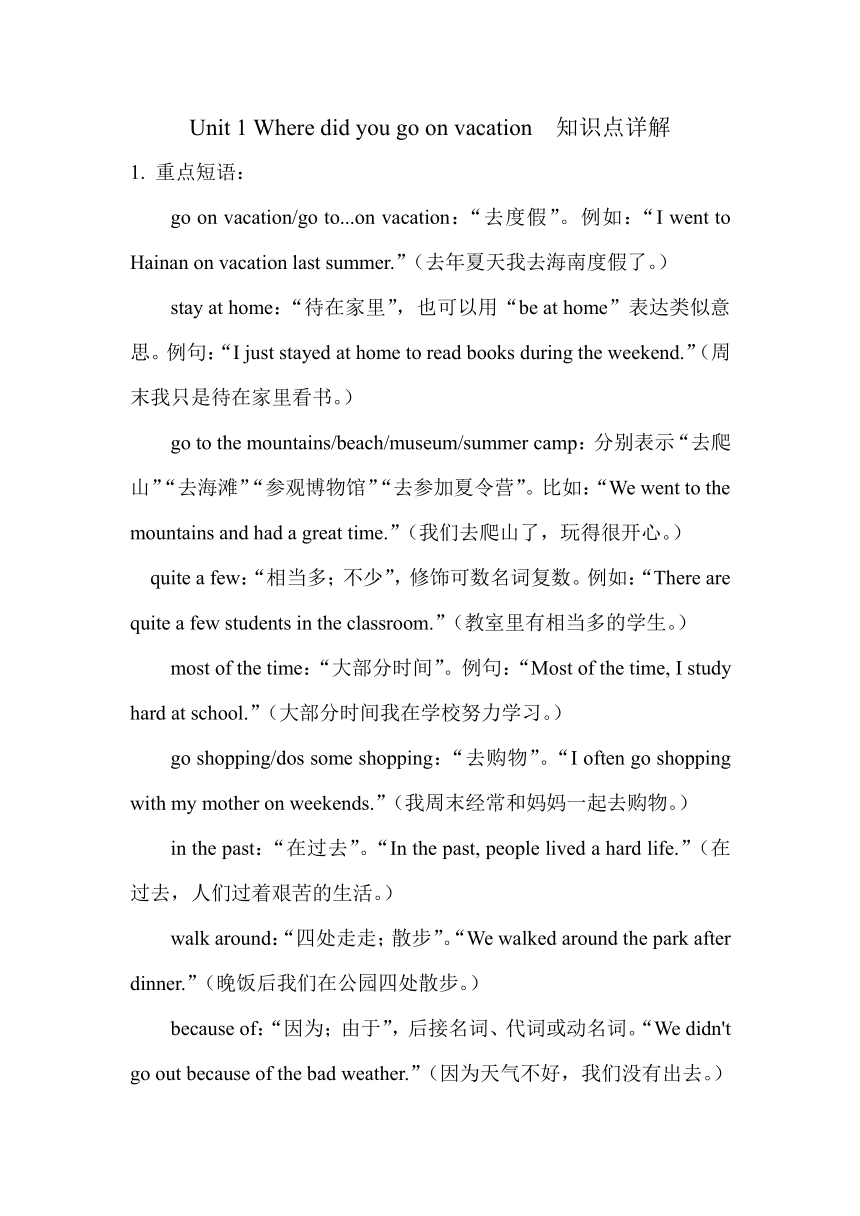
Unit 1 Where did you go on vacation 知识点详解 1. 重点短语: go on vacation/go to...on vacation:“去度假”。例如:“I went to Hainan on vacation last summer.”(去年夏天我去海南度假了。) stay at home:“待在家里”,也可以用“be at home”表达类似意思。例句:“I just stayed at home to read books during the weekend.”(周末我只是待在家里看书。) go to the mountains/beach/museum/summer camp:分别表示“去爬山”“去海滩”“参观博物馆”“去参加夏令营”。比如:“We went to the mountains and had a great time.”(我们去爬山了,玩得很开心。) quite a few:“相当多;不少”,修饰可数名词复数。例如:“There are quite a few students in the classroom.”(教室里有相当多的学生。) most of the time:“大部分时间”。例句:“Most of the time, I study hard at school.”(大部分时间我在学校努力学习。) go shopping/dos some shopping:“去购物”。“I often go shopping with my mother on weekends.”(我周末经常和妈妈一起去购物。) in the past:“在过去”。“In the past, people lived a hard life.”(在过去,人们过着艰苦的生活。) walk around:“四处走走;散步”。“We walked around the park after dinner.”(晚饭后我们在公园四处散步。) because of:“因为;由于”,后接名词、代词或动名词。“We didn't go out because of the bad weather.”(因为天气不好,我们没有出去。) feel like:“有……的感觉;想要”,后面可接名词、代词或动名词。“I feel like eating an ice cream now.”(我现在想吃一个冰淇淋。) 2. 重点句型: 特殊疑问句: Where did you go... :询问“你去了哪里?”例如:“Where did you go on vacation ”(你假期去哪里了?) What did you do... :询问“你做了什么?”如:“What did you do last weekend ”(你上周末做了什么?) Who did you go with... :询问“你和谁一起去的?”“Who did you go to the park with ”(你和谁一起去的公园?) 询问评价的句型: How was/were + sth/sb :“……怎么样?”例如:“How was the movie ”(电影怎么样?) How did you like it 与 What do you think of... :都可以用来询问“你认为……怎么样?”如:“How did you like the book ”(你觉得这本书怎么样?) 和 “What do you think of this city ”(你认为这个城市怎么样?) 3. 语法要点: 一般过去时: 含义:表示过去发生的动作或存在的状态。例如:“I visited my grandparents last week.”(上周我看望了我的祖父母。) 结构: 主语 + be 动词的过去式 + 其他。如:“She was happy yesterday.”(她昨天很开心。) 主语 + 实义动词的过去式 + 其他。例如:“He played basketball last Sunday.”(他上周日打了篮球。) 时间标志:yesterday(昨天)、last month/year(上个月/去年)、...days/months ago(……天/月前)、in 2002(在 2002 年)等。 一般疑问句: Was/Were + 主语 + 其他?例如:“Were you at home last night ”(你昨晚在家吗?) Did + 主语 + 动词原形 + 其他?例如:“Did you go to the zoo yesterday ”(你昨天去动物园了吗?) 否定句: 主语 + was/were + not + 其他。例如:“I was not at school yesterday.”(我昨天不在学校。) 主语 + didn't + 动词原形 + 其他。例如:“She didn't do her homework last night.”(她昨晚没做作业。) 不定代词: 定义:指没有确切指明是哪个人或事物的代词,如 someone/somebody(某人)、anyone/anybody(任何人)、everyone/e ... ...
~~ 您好,已阅读到文档的结尾了 ~~